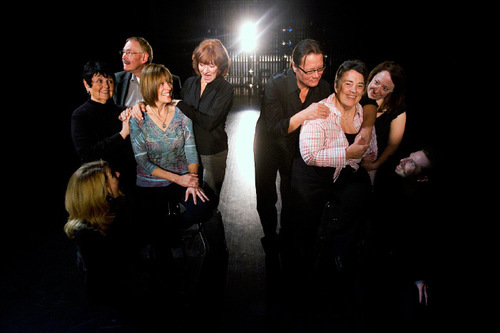This is an archived article that was published on sltrib.com in 2010, and information in the article may be outdated. It is provided only for personal research purposes and may not be reprinted.
Those who cannot remember the past are condemned to repeat it, said philosopher George Santayana.
Julie Jensen, a Salt Lake City-based playwright, writes plays from another angle on that famous saying: Those who don't explore or question the past are condemned to a dull, limited present.
In her work, Jensen has plumbed the question of what might have happened in the past, or more interesting, what could make our present times more rich with possibility.
"Two-Headed," Jensen's 1999 play based on the Mountain Meadows Massacre, explored the divergent paths of two adults who as little girls witnessed their parents' participation in the mass slaughter. "The Harvey Girls," produced as a reading earlier this year by Salt Lake Acting Company, dramatized the lives of East Coast girls who might have worked at the famous 19th-century chain of restaurants along the Santa Fe railroad that allegedly helped "civilize" the American West.
For her latest work, "She Was My Brother," Jensen turned to the little-known history of two late-19th-century ethnographers, Frank Cushing and Matilda Cox Stevenson. After studying the Zuni tribe of American Indians, the ethnographers took a Zuni to Washington, D.C., as a cultural ambassador.
Unbeknownst to the corridors of power in the nation's capital, the real-life charge of Cushing and Stevenson was a transgender male — in Zuni parlance, "two-spirited."
A Plan-B Theatre regional premiere production of "She Was My Brother" begins Oct. 28 and will run through Nov. 7 at downtown Salt Lake City's Rose Wagner Performing Arts Center.
The story begins when Tullis and Wilson, a recasting of the real-life ethnographers, descend on a Zuni community where they meet "two-spirited" Lamana. Both become intrigued, and then deeply enamored of, Lamana, thanks to the aid of Walt Whitman's "I Sing the Body Electric."
As Tullis and Cushing are drawn deeper into the spell of a person both feel they understand, the play builds poignant tensions around their struggle for Lamana's attentions and their heated arguments about how to represent and protect such an unusual specimen from outside enmity.
Science, passion and pragmatic considerations push up against each other in Jensen's dialogue, as Tullis and Cushing gauge what each believes is the true distance between two cultures.
Jensen said it was a difficult play to write, but became perhaps her favorite of all of her works. "For me, it's about a time in history when things could have changed, but did not," Jensen said. "Of course there's the argument about whether or not white society would have accepted the reality of a person like Lamana. But the fact that native cultures acknowledged such people would have been proof that cultures don't devolve into open debauchery when such people are given respect."
Jensen, who grew up in Beaver, received a Ph.D. in theater from Detroit's Wayne State University. She taught playwriting at seven colleges and universities, worked as a writer in Hollywood and directed the graduate program at the University of Nevada-Las Vegas before she returned to Utah as the resident playwright at Salt Lake Acting Company.
She's won numerous national awards and fellowships, and her plays have been produced across the country, as well as in London and at the Edinburgh Fringe Festival. But around town, other writers laud her generosity in helping develop new works.
The subject of "She Was My Brother" could be perceived as personal for Jensen, who is lesbian, and its debut production is timed during national Transgender Awareness Month. But Jensen took pains in her script not to idealize the Zuni, whose children were allowed to torture and kill animals.
Long before penning the first scene, Jensen dug deep into historical records, researching American Indian culture and its encounters, so often tragic, with white settlers. The Anglo attitude toward American Indians was so pessimistic, she learned, that many people didn't expect native cultures to survive the United States' encroaching westward expansion.
Efforts at preserving these soon-to-be-doomed civilizations were in full swing. With white people in charge, it was all too clear who decided what would be recorded, and how.
"You learn to a large extent that what we think of as 'freedom' was not a concept that was handed down to us from our Puritan forebears," she said. "That's largely native."
Director Jerry Rapier, who was raised in Arizona, said working with Jensen was worth waiting for the right opportunity. "All plays are personal to their creators, but this one seems especially so," he said. "It's also something of a personal experience for me. I grew up five hours away from the Zuni Pueblo. I'm ashamed to say that, before this play, I'd never been there."
Plan-B Theatre's 'She Was My Brother'
P Utah playwright Julie Jensen's play is directed by Jerry Rapier and features Joe Debevc, April Fossen and Jay Perry.
When • Oct. 28-Nov. 7; Thursdays-Fridays, 8 p.m.; Saturdays, 4 and 8 p.m.; Sundays, 2 p.m.
Where • Rose Wagner Performing Arts Center's Studio Theater, 138 W. 300 South, Salt Lake City
Info • $20 ($10 students) at 801-355-2787 or 801-297-4200, http://www.arttix.org or http://www.planbtheatre.org.



